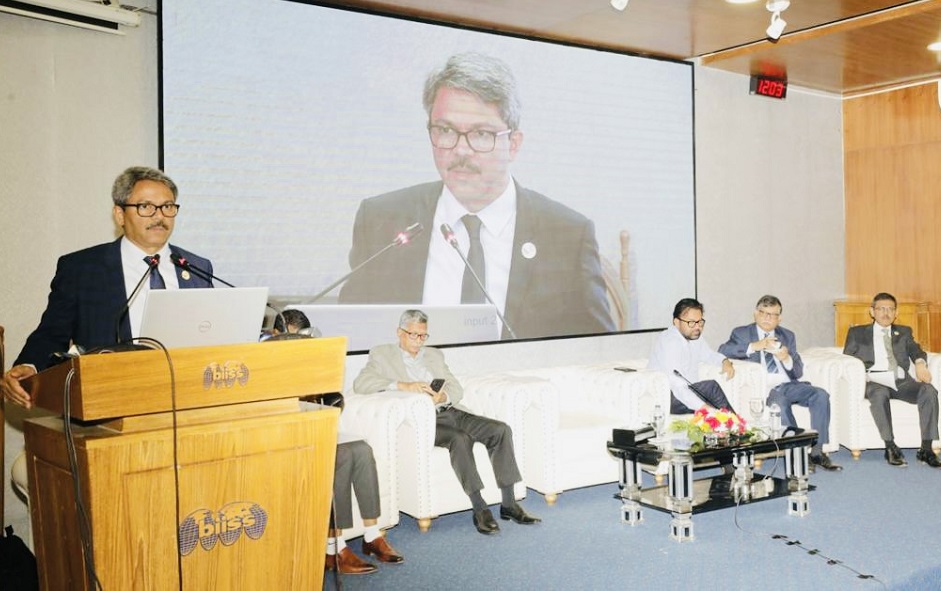Bangladesh urges international community to continue providing trade facilities to graduated countries

Published :
Updated :

Foreign Minister Dr AK Abdul Momen, on Sunday, called upon the international community to continue providing trade facilities to the countries who have graduated from the LDC status.
Addressing the 25th founding anniversary celebration programme of the Diplomatic Correspondents’ Association of Bangladesh (DCAB) in the city, the minister said that the continuation of trade facilities is essential for the successful transition of the graduated countries.
The minister attended the event through a virtual platform.
Quoting the UN secretary-general, the minister said the graduated countries must not be punished.
He said that the global financial regime or the international financial institutions need to understand that those who are graduating need a smooth transition.
The foreign minister also mentioned that though that developed countries pledged to contribute to climate funding to help vulnerable countries mitigate the loss, no money has been provided yet.
The foreign minister proposed that the developed countries which are polluting the climate should contribute 10 per cent of the defence budget to the climate fund.
Nearly US$ 2.30 trillion is being spent by these countries, he said adding that by providing 10 per cent of this budget the negative impact of climate change on the vulnerable countries can be mitigated.
He said his ministry stressed gearing up elementary economic diplomacy to help increase inward foreign direct investment so that the country can create more jobs for people and also increase trade.
State Minister for foreign affairs, M Shahriar, Alam, was the chief guest in the programme, and foreign secretary Masud Bin Momen was the special guest.
Ambassador Humayun Kabir, Chairman of the International Relations Department of the Dhaka University Lailufer Yasmin, and Secretary of the Press Club Shyamol Dutta were panel speakers at the discussion.
Shahriar Jaman of the Bangla Tribune and Mir Mostafizur Rahman of the Financial Express presented the keynote paper, titled “Role of media in pursuing foreign policy”, at the seminar, organised to mark the silver jubilee anniversary of the DCAB.
DCAB President Rezaul Karim gave the welcome speech and Secretary Imrul Kaes gave the vote of thanks at the programme moderated by Raheed Ezaz and Pantho Rahman.
In his speech, the state minister said that the diplomatic correspondents played a very responsible role during Bangladesh legal battle to establish its rights in the maritime boundary.
Lauding the role of media in realising the country’s development drive he said the foreign ministry always gives due importance to the media.
Mr Alam reminded that Bangabandhu Sheikh Mujibur Rahman also once chose to be a journalist.
Mr Masud said, “there are many issues that are contemporary and we are dealing with them and not all of them are meant for public consumption.”
“Some of it is in the formative stage, some in the internal discussion stage, some are ready for discussion with the stakeholders, and then the final output is ready,” he added.
“In foreign policy, there are some sensitive components.”
“And therefore, we do hope that your understanding and support because many of these issues have a lot of implications on our national life or daily life,” he added.
Ambassador Humayun Kabir said that in the age of social media, credibility becomes a key issue as a lot of things are being discussed on social media, some of which are not true.
He pointed out that journalists can play a crucial role in identifying which of those are true and which are wrong, and that is why journalists are greatly respected in society.
Ms Lailufer said the role of social media has been also very divisive in the wake of social media.
In our society and in the world, the rise of populism affected the process of the media’s role in informing people.
“For example, in the case of Brexit, the politicians accepted that they actually provided wrong information to the people on the basis of which they may take it such a big position for which the UK now has to deal with a very different way.”
“So we can see that how knowledge is power, knowledge can be divisive and knowledge can be exploited by a handful of people” she added.
In his keynote paper, Mir Mostafizur Rahaman said, in critical foreign policy issues like Bangladesh’s bilateral ties with its neighbours and important countries, local media played the role of both the information provider and opinion builder.
Media in both India and Bangladesh have been vocal in ensuring closer ties between the two countries against the backdrop of anti-Indian sentiment among a section in Bangladesh.
“In India, a lot of journalists have been proactive in suggesting to the ruling class that India should take steps to resolve disputed issues like water sharing and land border issues.”
“The Ganges water sharing treaty and land boundary agreement appeared to be the outcome of this pressure,” he mentioned.
“Similarly we have seen huge write ups in Bangladeshi media in favour of providing transit to India which was once an almost blasphemous issue in the post-75 regimes” he added.
mirmostafiz@yahoo.com


 For all latest news, follow The Financial Express Google News channel.
For all latest news, follow The Financial Express Google News channel.